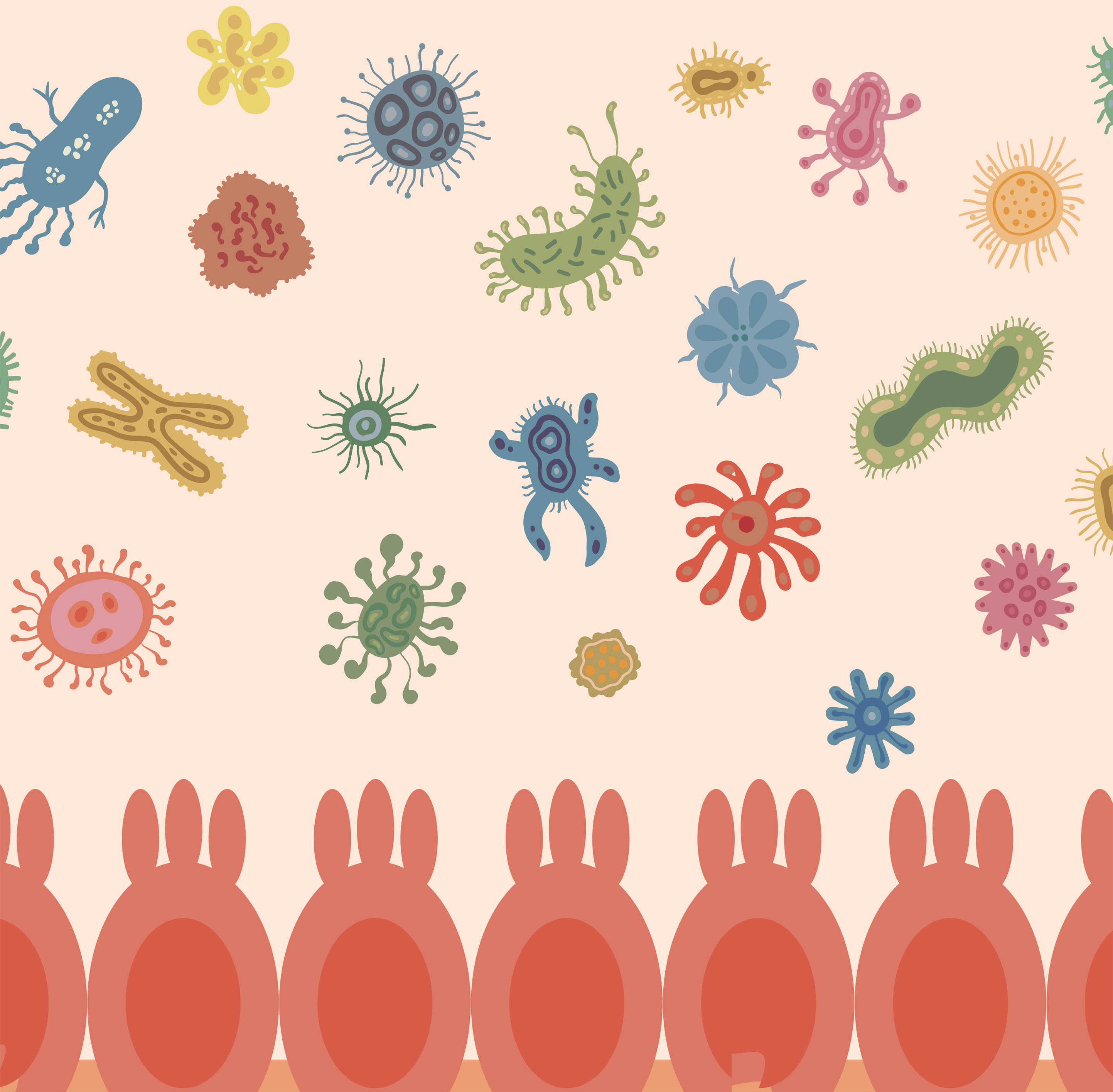At-A-Glance
- The microbiome—the community of bacteria, viruses, and fungi that live in your gastrointestinal tract—is now the focus of intense medical research due to its widespread impact on overall health.
- When the microbiome is unbalanced, beneficial bacteria can be depleted while harmful microbes thrive, contributing to digestive issues, inflammation, autoimmune conditions, and even mental health problems.
- Acid reflux can significantly weaken the microbiota, making it easier for harmful microbes or fungal overgrowth (such as Candida) to take hold. In fact, Candida esophagitis is common in individuals with long-standing reflux.
- An imbalanced microbiome may also trigger inflammation, impair digestion, and weaken the lower esophageal sphincter—the muscle that prevents stomach contents from flowing back into the esophagus—thereby increasing the risk of reflux symptoms.
- Proton pump inhibitors (PPIs)—such as Nexium, Prilosec, and omeprazole—can reduce acid reflux symptoms but may further disrupt microbial balance and prevent long-term healing
- Shared root causes—namely an unhealthy diet and lifestyle—contribute to both acid reflux and gut dysbiosis.
Dr Jamie Koufman on Facebook Live at noon EST on the first Wednesday of each Month. If you miss it live, you can also see it on YouTube.
“All disease begins in the gut.” – Hippocrates
Why Gut Health Matters
Today, gut health is at the forefront of medical research, with growing attention on the microbiome—the diverse community of bacteria, fungi, and viruses that inhabit the digestive tract. There are at least as many microbial cells in the gastrointestinal tract as there are human cells in the body. We are only just beginning to understand that the connection between gut health and acid reflux may be more significant than previously recognized.
A healthy microbiome supports nearly every system in the body. Beneficial gut microbes contribute to:
- Digestion
- Nutrient synthesis and absorption
- Immune system regulation
- Disease prevention
- Even mood and mental health
When the gut lacks beneficial flora, important biological functions decline while harmful microbes can multiply. This imbalance can lead to inflammation, immune dysfunction, and chronic disease. Yet despite everything we now know about the central role of the microbiome, neither the typical American diet nor the healthcare system reflects this understanding.
Many of the chronic diseases we face today—obesity, diabetes, heart disease, sleep apnea, and acid reflux, among others—are directly connected to the state of the gut. In short, you’re not just what you eat—you’re also what your microbes are made of.
But if the microbiome is so essential, why is it so often out of balance? The answer lies in how we live.
What Damages the Gut Microbiome?
Modern life poses daily challenges to the health of the gut microbiome. From dietary habits to medications and environmental exposures, many common aspects of life today can disrupt the microbial balance that supports digestion, immunity, and long-term wellness.
Diet and the Microbiome
The standard Western diet—high in processed foods, conventionally raised animal products, added sugars, refined grains, unhealthy fats, and low in fiber—is the most significant driver of microbiome disruption. These dietary patterns interfere with microbial diversity and fuel inflammation in several ways:
- Promotes inflammatory microbes: Excess sugar and processed fats feed bacteria that drive inflammation and weaken the gut barrier.
- Starves beneficial bacteria: A lack of fiber deprives gut microbes of the nutrients they need to thrive, shrinking populations of protective species.
- Alters gut pH: Highly processed diets can create an acidic environment in the colon, less hospitable to beneficial flora.
- Reduces short-chain fatty acid (SCFA) production: Without adequate fiber, the gut produces fewer SCFAs—compounds like butyrate that reduce inflammation and support gut integrity.
- Increases gut permeability: Damage to the gut lining may allow bacterial fragments, such as lipopolysaccharides (LPS), to enter the bloodstream, triggering chronic, low-grade inflammation.
While processed meats and industrial food products clearly have a negative impact on the microbiome, whole-food animal products also contribute to microbial disruption. In addition, high-protein, low-carbohydrate diets are equally detrimental. A plant-based diet offers the greatest support for gut and microbiome health.
Other Common Disruptors
Diet is only part of the story. Several non-dietary factors also contribute to microbiome imbalance:
- Medications: Especially antibiotics and NSAIDs
- Chronic stress: Alters gut motility, immune signaling, and bacterial balance
- Poor sleep and sedentary lifestyle: Both have been linked to reduced microbial diversity
- Environmental toxins: Pesticides, plastics (such as BPA), heavy metals, and industrial pollutants can disrupt microbial composition and gut barrier function
Common Signs of Microbial Imbalance
When the gut microbiome is disrupted—a state known as dysbiosis—it can manifest in many ways. Some of the more common symptoms include:
- Digestive issues: bloating, gas, constipation, and acid reflux
- Immune-related concerns: frequent colds, food sensitivities, skin irritation, and inflammatory conditions such as Hashimoto’s thyroiditis and joint pain
- Mood and energy disturbances: fatigue, anxiety, poor concentration
Over time, dysbiosis may also contribute to chronic conditions and metabolic disorders such as obesity and diabetes, as well as neurological and mental health conditions—including depression, Parkinson’s disease, and Alzheimer’s disease.
These early signs often develop long before chronic conditions appear. Addressing them through diet and lifestyle change may help prevent more serious health issues later on.
The Connection Between Gut Health and Acid Reflux
The relationship between gut health and acid reflux is not one-directional. New research suggests that reflux may both cause and result from an imbalanced microbiome—a dynamic, two-way interaction that is only beginning to be understood.
How Reflux Disrupts the Microbiome
Acid reflux alters the local environment of the upper digestive and respiratory tracts, changing both the pH and microbial landscape. Repeated exposure to stomach contents, including acid and digestive enzymes, can damage the mucosal lining, making tissues more vulnerable to infection and colonization by less beneficial organisms.
One common example is fungal overgrowth—especially Candida albicans—which can occur in the esophagus and throat after prolonged reflux.
In addition, many people with reflux are prescribed proton pump inhibitors (PPIs), which suppress stomach acid. While these medications can reduce symptoms, they also change the stomach’s natural defenses and have been shown to significantly alter the gut microbiome, reducing microbial diversity and increasing the risk of dysbiosis.
How Microbiome Disruption Contributes to Reflux
An imbalanced gut microbiome can also play a direct role in causing or worsening acid reflux. Disruptions in microbial balance may lead to inflammation, impaired digestion, and weakening of the body’s natural defenses against reflux.
Some of the ways an unhealthy microbiome may contribute include:
- Inflammatory activation: Harmful microbes can trigger the immune system in the digestive tract, leading to the release of inflammatory chemicals. This irritation can weaken the lower esophageal sphincter (LES)—the muscle that keeps stomach contents from from flowing back up into the esophagus.
- Immune dysregulation: When microbial balance is lost, the immune system can become either overactive or ineffective, increasing vulnerability to chronic irritation or infection in the esophagus.
- Disrupted motility: The gut microbiome plays a surprising role in regulating how the digestive tract moves. When gut bacteria are out of balance, it can slow gastric emptying or impair coordination between the stomach and esophagus. These changes may lead to bloating, delayed digestion, and increased likelihood of reflux episodes.
Recent research suggests that these effects may be driven not only by inflammation, but also by changes in how the immune system and nervous system interact with the gut.
These mechanisms also help explain why some patients with reflux also experience nausea, bloating, and belching—symptoms often associated with impaired motility and microbial imbalance.
Shared Triggers, Shared Solutions
The overlap between reflux and microbiome dysfunction extends to their root causes. Diets high in fat, sugar, and processed foods fuel both reflux and dysbiosis. Other contributing factors—such as chronic stress, alcohol consumption, and poor sleep—further impair gut function and weaken the protective barriers of the digestive tract.
While conventional reflux treatments may help relieve symptoms, they often do little to address these underlying patterns. In some cases, they may even worsen microbial imbalance over time.
How to Restore Gut Health (and Reduce Reflux)
Because acid reflux and microbiome health are closely linked, addressing both is essential for long-term healing. Fortunately, many of the same strategies that support gut health also help reduce reflux symptoms and improve digestive function.
Focus on Whole, Fiber-Rich Foods
A diet rich in whole plant foods provides the fiber and nutrients that beneficial gut bacteria need to thrive. Aim for a diverse mix of:
- Vegetables (especially leafy greens and cruciferous types like broccoli and cauliflower)
- Fruits (such as apples, pears, and berries)
- Legumes (lentils, black beans, chickpeas)
- Nuts and seeds (including almonds, chia, and flax)
- Whole grains (like oats, brown rice, and quinoa)
Dietary diversity is key—try to eat a wide range of plant-based foods each week to encourage a more diverse and resilient microbiome.
Limit Processed and High-Inflammation Foods
To support microbial balance and reduce reflux triggers, limit or avoid:
- Added sugars and sugary drinks
- Refined flour products, including bread and pastries
- Processed and packaged foods
- Fried or greasy meals
- Processed meats and conventionally raised animal products
- Alcohol and carbonated beverages
While individual tolerance varies, minimizing these foods can lower inflammation, improve digestion, and reduce the frequency of reflux episodes.
Incorporate Fermented Foods
Fermented foods are natural sources of beneficial bacteria and can help restore balance to the gut microbiome. These include:
- Yogurt and kefir (unsweetened, ideally with live cultures)
- Sauerkraut
- Kimchi
Start with small amounts and pay attention to how your body responds, especially if you’re sensitive to histamines or acidic foods.
Consider Omega-3 Fatty Acids
Omega-3s—found in fatty fish like salmon, sardines, and anchovies, as well as in flaxseed and walnuts—have anti-inflammatory properties and may support both gut and brain health. They may also help regulate immune responses, improve mood, and reduce systemic inflammation.
If you’re not getting enough omega-3s through food, fish oil supplements can be a helpful option. However, it’s important to choose high-quality supplements, as many conventional brands are prone to oxidation or may contain environmental contaminants like mercury, PCBs, or microplastics. Look for products that are third-party tested for purity, sustainably sourced, and packaged in dark or airtight containers to prevent rancidity.
For those following a plant-based or vegetarian diet, algae-based omega-3 supplements offer a clean and effective source of DHA and EPA—two essential fatty acids typically found in fish.
Drink Clean Water and Eat Mindfully
Stay well-hydrated with filtered water, and avoid beverages stored in cans or plastic bottles, which may leach chemicals that interfere with gut health.
Also, slow down and chew your food thoroughly. Eating too quickly is common in modern life and can impair digestion, increasing the likelihood of reflux and bloating.
Take a Probiotic
Probiotic supplements can help restore beneficial bacteria—especially after antibiotic use, poor diet, or periods of stress or illness. For people with acid reflux, probiotics may also help reduce symptoms by improving digestion and supporting the health of the gut lining.
While no one probiotic works for everyone, look for well-researched products from trusted brands, such as Garden of Life Once Daily Ultra. Consider consulting a practitioner for personalized guidance on strain selection and dosage.
Recent clinical evidence suggests that probiotics—especially strains of Lactobacillus and Bifidobacterium—may help improve acid reflux, although further research is still needed. A systematic review of clinical studies supports the potential benefits of probiotics in managing symptoms associated with reflux.
As with any supplement, quality matters. Look for probiotics that are third-party tested, contain multiple strains, and are formulated to survive stomach acid so they can reach the gut intact.
Emerging Therapies: Fecal Transplants and Beyond
Fecal microbiota transplantation (FMT)—transferring gut bacteria from a healthy donor to a patient—is an emerging therapy showing promise for severe gut dysbiosis. This procedure introduces an entire microbial ecosystem via colonoscopy, enema, or nasogastric tube. While effective in some cases, it is a broad and still-evolving approach.
In the future, analysis of your gut microbiota will enable more targeted therapies—such as personalized probiotics—that may allow for precise manipulation of the microbiome using specific bacterial strains.
The Gut–Brain Axis and Psychobiotics
The gut and brain are closely connected, and the emerging field of psychobiotics focuses on using diet, probiotics, and prebiotics to improve mental health through the microbiome.
For example, the MyNewGut consortium recommends a plant-based, high-fiber diet rich in fermented foods and fish for individuals with depression. This approach supports the gut-brain axis, helping to regulate mood and reduce inflammation.
Specific probiotics already target some neurological diseases. One specific example is Neuralli MP, a probiotic that contains the Lactobacillus plantarum strain PS128. While early animal research suggests it may benefit neurological conditions like Parkinson’s disease and autism, human studies are still limited, but some look as promising as the animal studies. As research develops, these types of targeted microbial therapies may become part of future treatment for both digestive, inflammatory, and mental health concerns.
Specific probiotics are already being developed to target neurological diseases. One example is Neuralli MP, a probiotic that contains the Lactobacillus plantarum strain PS128. While early animal research suggests it may benefit neurological conditions like Parkinson’s disease and autism, human studies are still limited—though some appear as promising as the animal studies.
As research continues to develop, targeted microbial therapies like this may become part of future treatment approaches for digestive, inflammatory, and mental health concerns.
Final Thoughts
The gut microbiome plays a central role in nearly every aspect of health, from digestion and immunity to energy, sleep, and emotional balance. For individuals with acid reflux, restoring microbial balance may be a key piece of the puzzle—both in managing symptoms and preventing long-term complications.
True healing begins with a healthy diet and lifestyle that support the body’s natural microbial ecosystem. By focusing on whole foods, primarily plant-based, reducing inflammatory triggers, and nourishing the gut, it’s possible to not only minimize reflux but also strengthen the foundation for lifelong health.
For more information about diagnosis and treatment of acid reflux, see two companion books on Amazon: Dr. Koufman’s Acid Reflux Diet and Dropping Acid: The Reflux Diet Cookbook & Cure. If you would like to receive personalized guidance and strategies for lasting relief, consider scheduling an online consultation










